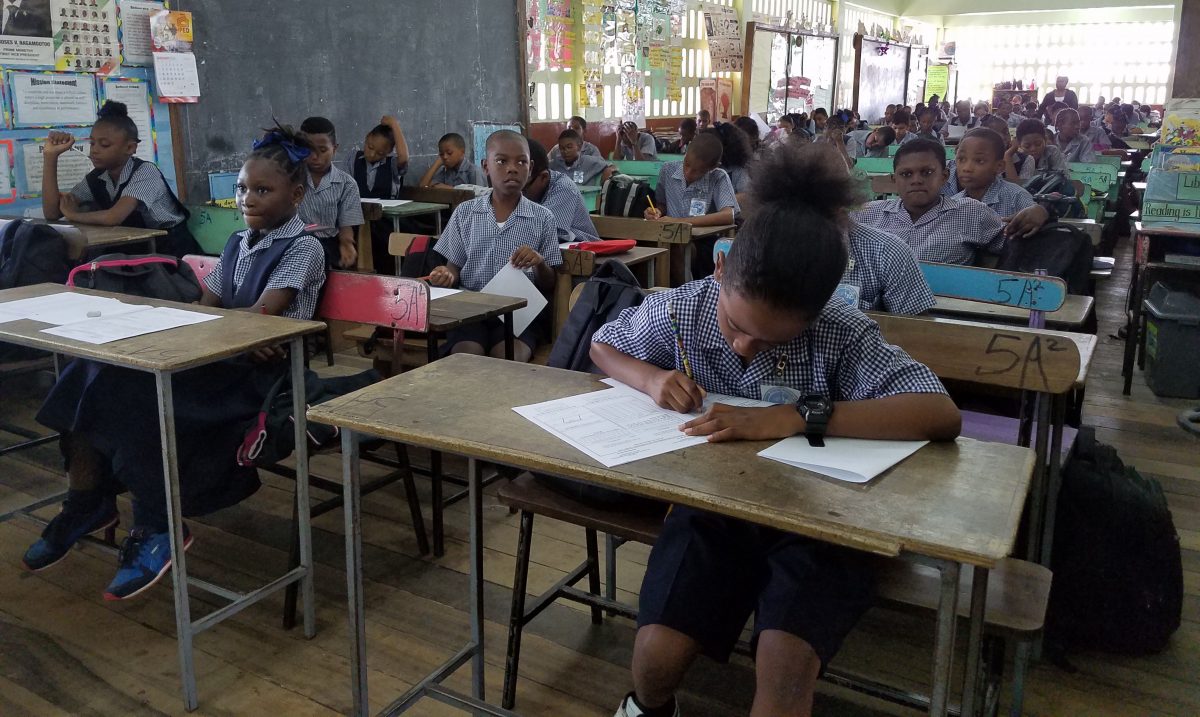With the Education Minis-try preparing to move ahead with the holding of examinations for thousands of students across the country next month, the leadership of the Guyana Teachers’ Union (GTU) yesterday said it would not be supporting the decision as it maintained that the school environment poses a “threat” to learners, teachers, and families due to inadequate coronavirus safety protocols.
As a result, while the ministry has asked teachers to report for duty from next week to prepare classrooms for the return students who are due to sit examinations, the union yesterday urged teachers to continue engaging students virtually from their homes.
The GTU issued the statement following a webinar hosted yesterday by the ministry, where Assistant Chief Education Officer (Secondary) June-Ann Gonsalves and Assistant Chief Education Officer (Primary) Carol Benn voiced their confidence that students were prepared to sit scheduled national and regional exams next month due to aids that were made available to them while they were at home since mid-March due to coronavirus distancing measures.
Grade Six students are due to sit the National Grade Six Assessment (NGSA), which will determine placement at secondary schools, while eligible secondary level students are due to sit the examinations being administered by the Caribbean Examinations Council (CXC) for the Caribbean Secondary Education Certificate (CSEC) and the Caribbean Advanced Proficiency Examination (CAPE).
Gonsalves and Benn said that during the time students were at home, they were able to learn using the ministry’s alternative learning approach, which entailed online learning, the use of radio, television or even newspapers and also past test papers that were distributed by the ministry. They also said students in hinterland areas were also suitably engaged, despite concerns raised by the Amerindian People’s Association.
They said that before the decision to administer the NGSA was made, careful consideration was done. This includes receiving feedback on teacher and student engagement. The Director for the National Centre for Education Resource Development Jennifer Cumberbatch, who also participated in the webinar, also assured that a lot of planning was done in consultation with the Ministry of Public Health and other stakeholders before a decision was taken to set the dates for the NGSA examinations. She also noted the ministry’s priority is the safety of the students who have to write the exams.
The officials also said that plans for other classes were still being finalised but the ministry was looking to have senior classes return to school first then nursery and special education schools would be opened. However, they noted that at the moment the focus is on the examination-level students and that the other levels would be looked at if a decision for reopening of schools is made.
By way of a gazetted order, the ministry announced on Wednesday that there are strict protocols to ensure safety as students set out to take the exams. Some of these include that all schools have appropriate sanitisation stations, a designated sick bay, adequate sanitisation supplies for routine cleaning of the schools and markings to ensure persons are six feet apart at all times (these are expected to be dealt with prior to the opening of the schools). Additionally, students are expected to wear face masks before entering the school compound, but should they show up without masks, one will be provided for them. Washing of hands and checking of temperatures will be done and in the event of a student showing up with a temperature greater than 38 degrees Celsius, the child will be isolated in the sickbay area and screened by medical personnel.
Daily cleaning and sanitising will be done before the commencement of exams and cleaners will be trained in infection prevention and control practices.
Unsafe
However, following a Special General Council meeting, which was held virtually yesterday, the GTU made its objections clear, while saying that it believes the union’s recommendations were not considered. The union had recommended that schools be reopened in September for the third term of the current academic year, with the NGSA to be written by students in October and CSEC in September of this year. It also proposed that the new school year be started in January of 2021.
“The school environment poses a threat to learner, teachers, other school staff and families,” the union said in a statement issued after its meeting. “It must be noted that the provisions outlined in the gazetted order are inadequate to say the least while not much consideration was given to the welfare of teachers who would have to be in direct contact with students in the school environment,” it added.
According to the union, its General Council strongly disagrees with the timing of all the examinations and “therefore will not support its implementation in July 2020.”
It added that it agreed that placing learners, teachers and other school staff in an open school environment void of the necessary medical clearance for anyone to operate in was a “serious threat.” “The union therefore advises members to continue engaging their charges virtually from the safety of their homes as you have been doing over the last two months,” it said, while noting that Guyana has over 70 active COVID-19 cases and therefore the outdoors remain unsafe.
The union further pointed out that countries which opened up their schools prematurely were forced to order them closed again due to increased cases of the virus. It cited Suriname as one such case, moving from zero to over 50 cases in less than a week after reopening.
The Federation of Independent Trade Unions of Guyana (FITUG) yesterday also released a statement voicing its support for the union’s initial objections to the reopening of schools.



